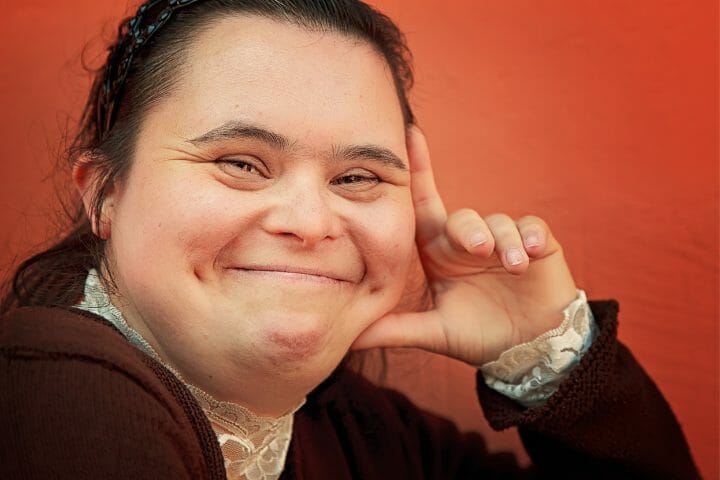Down syndrome causes several physical and mental impairments in a child. But is Down syndrome a disability, and as such is it eligible for disabiltity benefits from the government? Let’s find out.
Contents
When a child is born, one of the first things they have to be checked for is birth defects or chromosomal disorders. Affecting both the physical and mental well-being of a baby, birth defects are usually long-term conditions that they have to live with throughout their life.
According to the numbers given by CDC, Down Syndrome is one of the most common chromosomal disorders among newborn babies. Today, 1 in every 700 babies is born with Down Syndrome. Between 1979 and 2003, the number has gone up by 30%.
For children and parents of children with Down’s Syndrome, it is important that the conversation around this condition is encouraged so that they can be part of society without facing troubles in their everyday life.

What is Down Syndrome?
Down syndrome is a condition caused by an error in cell division that results in an extra chromosome 21. This extra chromosome causes the characteristics associated with Down syndrome. People with Down syndrome can have physical and mental challenges.
They may also have trouble breathing and digesting food properly. People with Down syndrome often have physical characteristics such as low muscle tone, small stature, and eyes slanted upwards. They may also have intellectual disabilities and delayed development.
People with Down syndrome are often born with congenital heart defects. People with Down syndrome are also at an increased risk for certain medical conditions, such as Alzheimer’s disease, thyroid problems, and leukemia.
There is no cure for Down syndrome, but there are treatments and support available to help people with the condition live healthy and fulfilling lives. Early intervention and treatment can help improve the development of children with Down syndrome.
Most people with Down syndrome live to be 60 years old. There is no cure for Down syndrome, but treatments and support can improve the quality of life.
You might also like to read: Can You Get Disability With Tourette’s Syndrome?
Is Down Syndrome A Disability?
While every individual with Down syndrome is unique, they all share certain characteristics. Developmental delays are common, and most people with Down syndrome have some level of intellectual disability.
Additionally, physical abnormalities and health problems associated with the condition are also common. As a result, people with Down syndrome often require lifelong care and assistance. In general, people with Down syndrome do experience developmental delays and have some level of intellectual disability.

Moreover, they may also have physical abnormalities and health problems associated with the condition. As a result, many people with Down syndrome require lifelong care and assistance.
There are a number of organizations and resources available to help support individuals with Down syndrome and their families. Additionally, there is ongoing research into potential treatments and therapies that may improve the quality of life for people with Down syndrome.
How Can You Qualify For Social Security Disability Insurance With Down Syndrome?
Social Security Disability (SSD) Insurance is a right of every citizen living with a disability in the United States. When it comes to Down Syndrome, depending on the severity of the insured person, the SSD requires medical conditions, certified by physicians and diagnosis to be supplied with their applications. This depends on what type of Down Syndrome an individual is suffering from.
There are two types of down syndrome, mosaic and non-mosaic. Mosaic down syndrome is caused by a mistake in cell division called nondisjunction.
This occurs when the chromosomes don’t separate properly during cell division, resulting in too many or too few chromosomes. Non-mosaic down syndrome is caused by translocation, which is when a piece of chromosome 21 breaks off and attaches to another chromosome.
Non-mosaic Down syndrome, also called trisomy 21, is the most common type of Down syndrome. It happens when you have three copies of chromosome 21 instead of the usual two. This extra genetic material changes how the child develops and creates the conditions that cause Down syndrome.
This condition results in mild to moderate cognitive impairment and some physical characteristics that are typical of the syndrome. Each medical condition has to be listed and certified by a physician when the insurance application is in the process.
You might also like to read: Gifts for Adults with Downs Syndrome
Non Mosaic Down Syndrome
To qualify for SSD, it takes a simple diagnosis and physician’s report to make a person eligible for the insurance. The listing will be examined as per the individual and what level of impairment they are living with.
In order to qualify for social security disability benefits, there are a few details that have to be provided to the SSA.

- You will need to provide the SSA with medical evidence and information about your symptoms (or the symptoms of those for whom you are applying).
- This may include records detailing the diagnosis of Down syndrome, as well as information on any associated health conditions. This would include – a karyotype analysis signed by a physician, or a chromosomal report of the person to be insured.
- The person to be insured will need a doctor’s certificate mentioning physical features of Downs Syndrome as evidence of their disability. This should also mention the level of disability or type of Downs Syndrome they suffer from.
- In some cases, insurers may also require information on the family’s medical history and genetic testing results.
- It is important to contact the insurer directly to determine what specific information will be needed in order to qualify for coverage. By working with the insurer and providing the required information, you can help ensure that you have the coverage you need to protect yourself and your family.
Mosaic Down Syndrome
For individuals suffering from Mosaic down syndrome, the disabilities qualification will be different. Mosaic Down syndrome is a rare condition in which a person has some cells with the typical chromosomal abnormality associated with Down syndrome, and other cells that have the normal 46 chromosomes.
It is important to note that people with mosaic Down syndrome can have varying degrees of intellectual disability and physical abnormalities, depending on the percentage of affected cells in the body.
People with mosaic Down syndrome usually have a milder form of the condition, and may not experience all of the typical features associated with Down syndrome. For this category, a diagnosis report is not enough.
There are specifically listed impairments that are examined and presented as evidence by a physician to make them eligible for the SSD benefits. These listed impairments include congenital heart defects, low IQ, thyroid disorders, and other associated chronic health conditions.
It should be remembered that there will be a thorough examination of all forms of impairments and health conditions when an insurer is applying for SSD with Downs Syndrome. It is to determine what is the limitation of a person, depending on which they will be eligible for the social security benefits.
You might also like to read: Is Down Syndrome An Intellectual Disability?
How Can You Qualify For Supplemental Social Insurance With Down Syndrome?
There are a few different ways that people with Down syndrome can qualify for supplemental social insurance, which can help to cover the costs of things like medical care and housing.

One way is through the SSA’s Supplemental Income (SSI) program, which provides financial assistance to people with limited income and resources who are disabled, blind, or 65 years of age or older.
People with Down syndrome may also qualify for SSA’s Disability Insurance program (SSDI), which provides benefits to people who have worked and paid into the Social Security system.
In addition to these federal programs, there are also a number of state and local programs that offer financial assistance to people with Down syndrome and their families.
For example, many states have Medicaid programs that provide health coverage for people with low incomes, and some states also have programs that provide financial assistance for housing or other needs. You can find out more about these programs by contacting your state’s social service agency or disability office.
There are also a number of private organizations that offer financial assistance and other support services to people with Down syndrome and their families. These organizations typically have their own eligibility requirements, so it’s important to check with them directly to see if you qualify for their assistance.
Starting an Application
When applying for social insurance with Down Syndrome as a listed disability, it can be done through the regular channels of social insurance. The processes involved will be as follows:

- The first step is to contact your local Social Security office and set up an appointment.
- You will need to bring along some form of identification, such as a driver’s license, birth certificate, or passport, as well as your social security card.
- Once you have set up an appointment, you will need to fill out an application and provide any necessary documentation.
- After your application has been processed, you will be notified of your eligibility for social insurance benefits.
If you are found eligible for social insurance benefits, you will then need to pay premiums on a monthly basis. The amount of your premium will depend on a number of factors, including your income and the number of people in your family who are covered by the policy.
Frequently Asked Questions
Is down syndrome a mental or physical disability?
There is no one answer to this question as it is different for every individual with Down syndrome. Some people with Down syndrome may have more mental disabilities than physical disabilities, while others may have more physical disabilities than mental disabilities.
Down syndrome life expectancy?
The average life expectancy of a person born with Down Syndrome is around 60 years of age
How is Down syndrome diagnosed?
Down syndrome is most often diagnosed during pregnancy. A prenatal test called cell-free fetal DNA testing can be done 10 weeks into the pregnancy. This test looks for pieces of the fetus’s DNA in the mother’s blood and can diagnose more than 99 percent of pregnancies with Down syndrome.
Is Down syndrome a cognitive disability?
Is Down syndrome a cognitive disability?Yes, Down syndrome is considered a cognitive disability. Individuals with Down syndrome typically have lower than average cognitive ability and may have difficulty with some learning tasks.
However, the degree of cognitive impairment can vary greatly from person to person. Some individuals with Down syndrome are able to live relatively independently, while others may need more support.
Final Words
People with Down syndrome are able to live relatively normal lives with the help of supportive family and friends, as well as educational and other services. Early intervention programs that provide speech, occupational, and physical therapies can help improve communication skills, fine motor skills, and social skills.
The most important thing is to engage in awareness about the condition and help people gain more information about the same. It is not something that people need to be ashamed to live with, instead, they need our assistance to live full and pleasant lives.
Thank you for reading!
